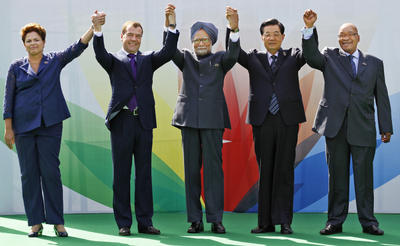Growth in emerging markets and the slow resolution of the European debt crisis present different problems but their solutions are linked. If the IMF and World Bank respond to the demands of emerging markets for reforms, they will be better able to deal with European governments.
The IMF projects that the growth rates of Brazil, Russia, India, China and South Africa (or the BRICS countries) between now and 2017 will be effectively double that of the United States, France and Germany. These rising powers have called for reform of international economic organisations so that the distribution of power within them better reflects reality. They want to rewrite the rules to give emerging markets more voting power — because votes in these organisations are tied to the size of a state’s economy — and revise the selection process for leaders of the IMF and the World Bank so that the process is based on merit rather than great-power preferences.
These efforts have not yet been successful. IMF voting reforms require US congressional approval, which has yet to occur. Barring an agreement, emerging markets will remain underrepresented. And although the recent appointments of Christine Lagarde and Jim Kim both stemmed from competitive processes, the ‘gentleman’s agreement’ between the United States and Europe to split control of the IMF and World Bank shows no sign of coming to a close.
In the coming year, the US/European dithering over reform will face a serious test because BRICS countries have an option other than the IMF and the World Bank. If they can’t secure reforms of existing international organisations, they’ll create new ones that serve their interests. This is not a hypothetical option — there were discussions of a BRICS development bank at their summit last March.
The consequences of such a bank for the IMF and World Bank would be disastrous. Not only would competition limit their ability to lend, but differences in conditionality would alter the course of policy reform in borrowing countries. Allowing the emergence of a BRICS bank would undo the commitment to multilateral leadership enshrined at Bretton Woods, as the United States would find itself increasingly frozen out of developing markets.
Apart from competition, the euro zone’s abuse of the IMF as a financial surrogate shows why the institution needs to be reformed. In April 2012, the IMF was steamrolled by the Europeans into lending to Greece a month before elections, in a situation in which both the political and economic settings suggested a more cautious approach. In November, the IMF’s proposals for official debt relief for Greece were rejected in favour of a debt buyback plan that was more politically acceptable to other euro zone members. The focus on austerity and the lack of results also demonstrate a pressing need to invigorate global economic governance, as one of the casualties of the crisis has been the independence of the IMF.
The status quo can only lead to increasing resentment by rising BRICS countries and a continuing charade in Europe. Washington’s best option is to publicly advocate for voting shares that reflect the growing power of the BRICS countries. This would make it more difficult for European countries to meddle with the IMF and also ensure that emerging-market economies are committed to extant global institutions rather than to building regional competitors.
The United States can get something in return for supporting emerging powers, too. In exchange for the US commitment to open leadership selection and support for voting reform, emerging powers should be prepared to accept working in a more transparent IMF. Additional reforms will strengthen the capabilities of the Fund and allow it to become a more useful partner in global policy making.
Empowering the IMF would require additional elements to voting reform. The rising powers that receive increased voting shares should commit to publicly releasing findings from their respective surveillance consultations with the IMF. Both rising and established countries should also commit to strengthening global economic surveillance by bolstering the G20’s Mutual Assessment Program and by making these findings public.
This exchange would reinvigorate the Fund and serve to bolster domestic reform within emerging-market countries. We do not know whether the BRICS countries will continue in their paths of economic liberalisation, and a public commitment to greater transparency would make it much easier to check these countries should their commitment to reform waver. And more emerging-market influence would provide a means to stop the Europeans using the IMF to serve their own ends in the euro zone crisis.
Rebuilding international organisations at a time in which they’re most in demand can seem counterintuitive, but this crisis offers an opportunity to recalibrate the IMF’s mission so that it is more influential with leading economies. In terms of devising policies to resolve the economic crisis, this should be a welcome step.
Martin S. Edwards is Associate Professor at the John C. Whitehead School of Diplomacy, Seton Hall University.
This article was first published here on Project Syndicate.

